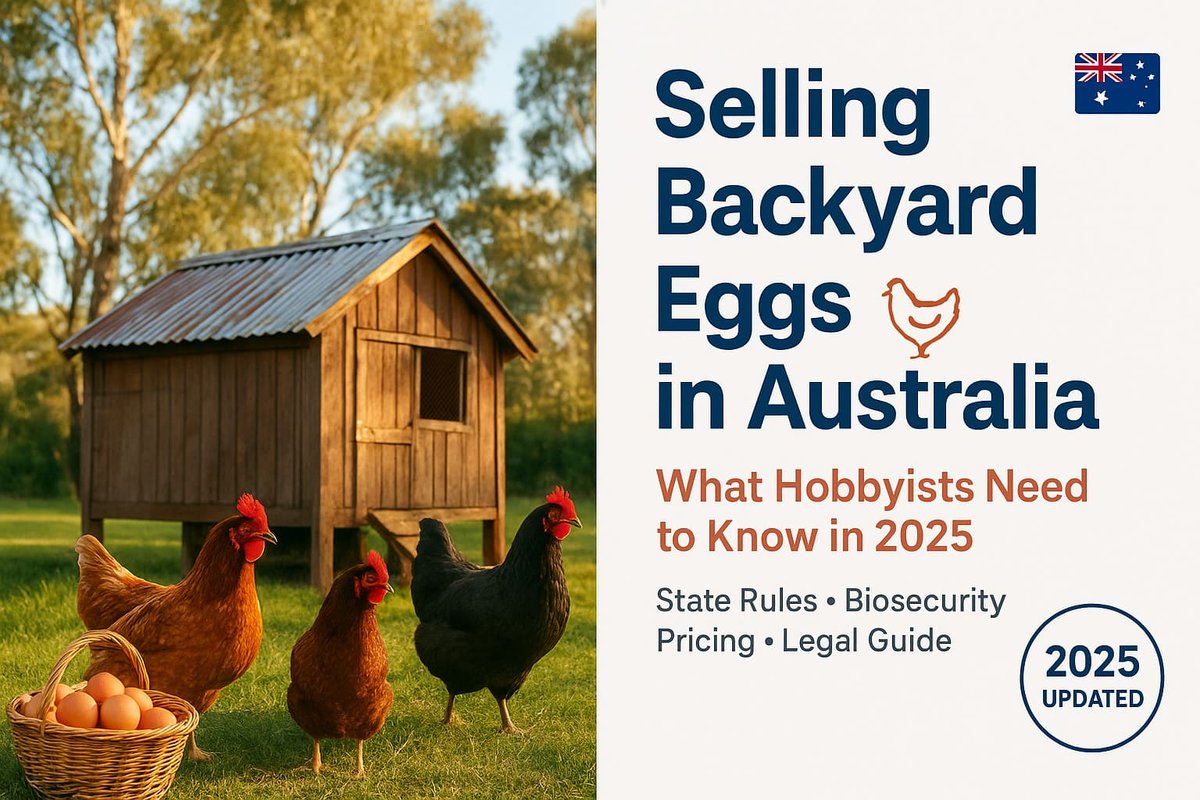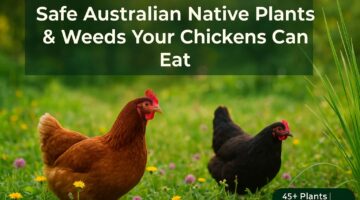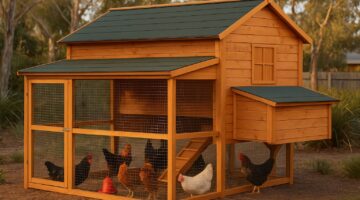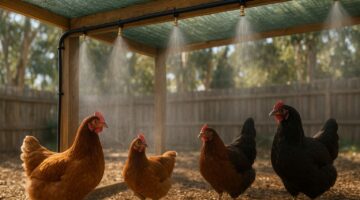G’day! If you’ve got a few chooks scratching around the backyard, you know the joy of collecting fresh eggs every morning. It feels like a throwback to a simpler time.
But let’s be honest, with egg prices in the shops seeming to climb every month (up 20-25% in 2025 from avian flu shortages and supply issues!), and the general cost of living on everyone’s mind, you might be looking at your overflowing egg basket and wondering, “Can I sell my eggs for money in Australia?” With states like WA leading Australia’s battery cage phase-out, backyard eggs are more appealing than ever.
The short answer is: Yes, you absolutely can!
I started with just 10 hens in my Sydney backyard (if you’re just getting started, check out our guide on where to buy chickens in Australia from reputable hatcheries and breeders), and now I make about $100 a month selling my extra eggs to neighbours and at a local honesty box. Before you start selling eggs, you might want to understand the full startup costs of keeping chickens in Australia, including feed, coops, and ongoing care—knowledge that helps you price your eggs fairly. It’s a great way to make your hobby pay for itself, cover feed costs, and share that “fresh egg” joy with your community.
But, as I learned, you can’t just stick a sign out the front withoutknowing the rules. Selling food, even just a few eggs, comes with real responsibilities. We need to keep things safe, keep our customers healthy, and stay on the right side of the law.
This guide will walk you through everything you need to know about “Selling Backyard Eggs in Australia” as a small-scale hobbyist. We’ll cover the facts, not fluff, so you can get started the right way.
What You’ll Learn in This Guide
- Is it legal? The simple yes/no and what that really means.
- Biosecurity: The #1 rule you can’t ignore in 2025.
- Permits & Rules: A deep dive into every state’s laws (not just the big ones!).
- Stamping Eggs: Do you need to? And if so, how?
- Troubleshooting: Why you might be struggling to sell and how to fix it.
- Storage & Safety: How to store eggs like a pro so they’re perfect for customers.
- Selling Steps: A simple, actionable step-by-step on how to sell your eggs.
- Making Money: How much you can really make and how to set your price.
- Tax Time: The simple ATO rules for hobbies vs. businesses.
We’ll follow the official food safety standards, like those from FSANZ (Food Standards Australia New Zealand), but in simple terms. By the end, you’ll be a mini-expert, ready to sell your eggs safely and legally.
Is It Legal to Sell Eggs from Home in Australia? Yes! (And What “Legal” Means)
Yes, it is completely legal to sell eggs from your home in Australia, especially for hobbyists. You don’t need to be a massive commercial “egg farming Australia” operation. The rules are set up to separate big farms from backyard folks. The government knows you’re not a giant company; you’re likely a family with 5-20 hens. Before selling, make sure you’re also compliant with backyard chicken laws in Australia, which vary by council and cover flock limits, noise restrictions, and setback distances.
The main rule for everyone, big or small, comes from FSANZ Standard 4.2.5 (Primary Production and Processing Standard for Eggs). This sounds fancy, but the basics for hobbyists are simple common sense:
- Keep things clean: Your coops, nests, and collection areas must be clean. This stops eggs from getting covered in poo (faeces) or dirt, which is the main source of bacteria.
- Prevent Salmonella: This is the big one. Salmonella is a nasty bug that can live on the outside of eggshells. Clean nests and healthy chooks are the best prevention.
- Sell good eggs: Only sell eggs that are clean, not cracked, and fresh. A cracked egg is an open door for bacteria.
- Keep chooks healthy: Ensure your chickens have clean water, good food, and are free from disease. Part of this also means protecting your flock from Australian predators like snakes, foxes, and birds of prey.
As a hobbyist, you are generally selling “ungraded” eggs. This just means you haven’t sorted them by weight (like 600g, 700g, etc.) in a big, expensive machine. This is totally fine for direct sales to friends, neighbours, or at the farm gate.
Biosecurity: Your #1 Responsibility in 2025
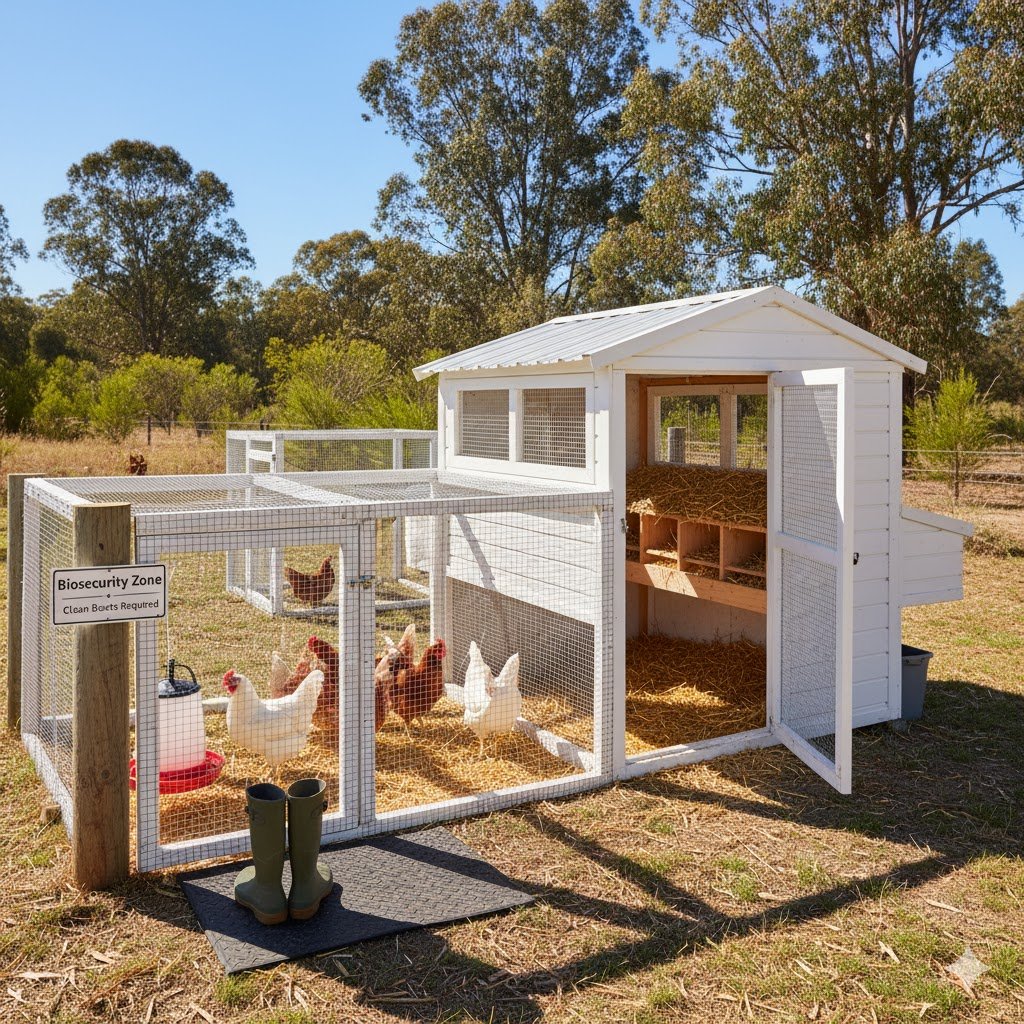
In 2025, knowing about biosecurity isn’t just for big farms—it’s for us, too. With recent scares of Avian Influenza (bird flu) around the world, state authorities are cracking down to protect all poultry. (As of November 2025, no active outbreaks are in Australia, but heightened monitoring continues.)
“Biosecurity” just means protecting your flock from disease, and stopping any disease from spreading from your flock. For a backyard owner, this means:
- Pest Control: Keep rats, mice, and wild birds away from your coop and feed. They are major disease carriers.
- Clean Footwear: Have a pair of “coop boots” that you only wear inside your chicken run. This stops you from tracking in germs from the street.
- Quarantine New Birds: If you get new chooks, keep them separate from your main flock for at least 14-30 days to make sure they’re healthy. Per 2025 DAFF guidelines under the Australian Animal Welfare Standards and Guidelines for Poultry, this helps prevent avian flu spread.
- Report Sick Birds: If you have multiple birds die suddenly or show strange symptoms, you must report suspicions to your local vet or the Emergency Animal Disease Watch Hotline at 1800 675 888.
This isn’t just a suggestion; it’s a key part of being a responsible animal owner and food seller. For deeper guidance, check out our comprehensive biosecurity plan for backyard flocks, which covers disease prevention, quarantine protocols, and emergency response.
Keeping your flock healthy is the first and most important step in selling safe eggs. Now, let’s figure out if you’re a “hobbyist” or a “business” in the eyes of the law.
Can You Sell Eggs from Your Backyard Chickens? Yes, If You’re a Hobbyist
So, “Can you sell eggs from your backyard chickens?” Yes! But as we’ve covered, the rules you need to follow depend on the scale of your operation. The government wants to encourage small-scale production but needs to ensure food safety.
Small Hobbyist vs. Big Business: Where Do You Fit?
Most states have a general limit for what they call a “small-scale producer” or hobbyist. This limit is often around 20 dozen (240 eggs) per week.
If you sell less than this, you’re a hobbyist. If you sell more than this, you’re usually seen as a commercial business. That means you’ll need more permits, food safety programs, audits, and you’ll definitely have to stamp your eggs.
For most of us with a handful of chooks, we stay well under this limit. If you want more detailed strategies on legally selling backyard eggs beyond just compliance, including marketing and pricing tactics, we’ve got you covered.
Who Can You Sell To? (Direct vs. Third-Party)
This is a critical rule. As a hobbyist, you are almost always limited to direct-to-customer sales.
This means you can sell:
- At your farm gate or front step (an “honesty box” is perfect).
- To your friends, family, and neighbours.
- At a local farmers’ market (you’ll need to show your state/council registration).
You generally cannot sell your eggs to a third-party business that will then sell them to someone else. This includes:
- Local cafes or restaurants.
- Corner stores or grocers.
- Bakers or other food makers.
To sell to a business, you need a commercial licence, as the traceability and food safety rules become much, much stricter.
Staying “small scale” and selling “direct-to-customer” keeps things simple. The next step is to find out exactly what registration you need in your specific state.
Do You Need a Permit? A Must-Read State-by-State Guide
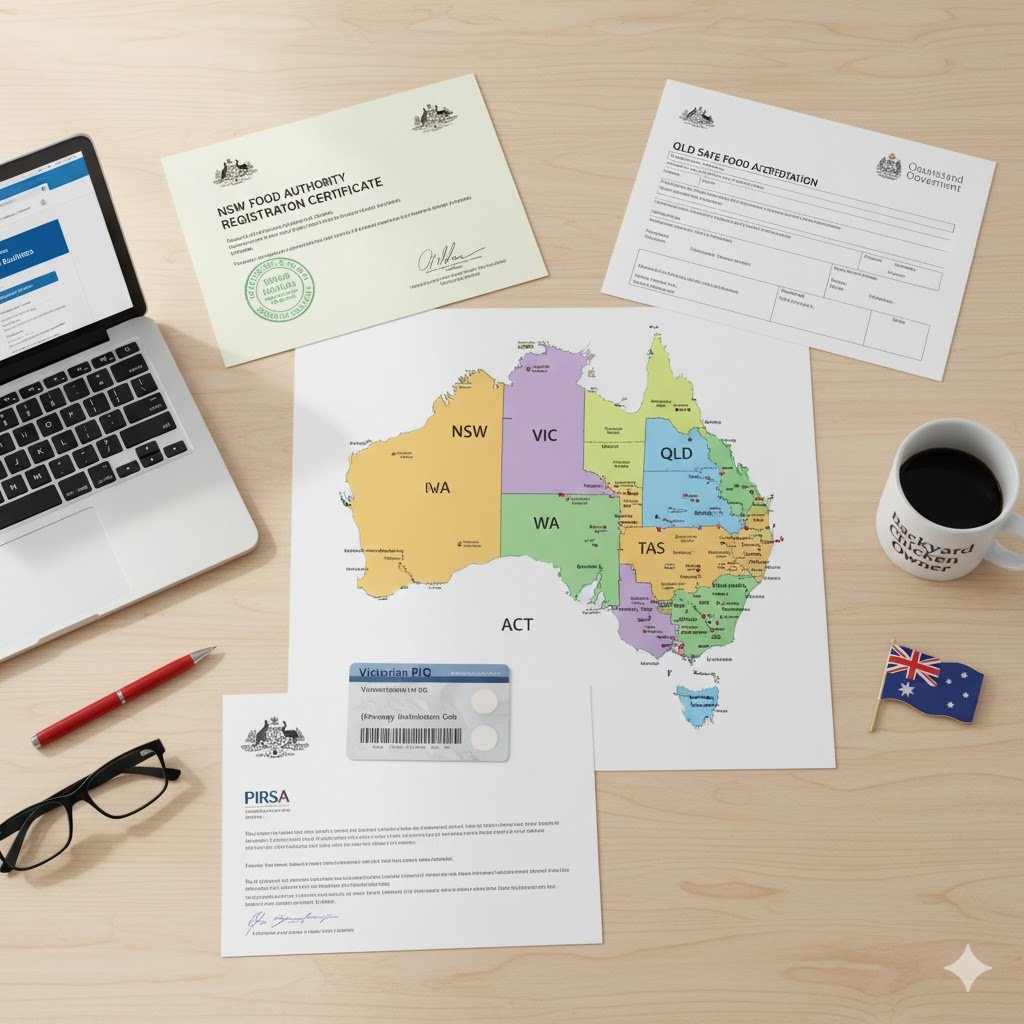
This is the most important question, and the answer is… it depends entirely on your state. These “Australian state egg laws for hobbyists” are the main thing you need to learn.
Nationally, for small-scale sales, you don’t need a big federal permit. But state governments manage food safety, and their rules are different. This is where many people get confused.
Here’s a simple breakdown. Find your state and read the rules that apply to you.
| State | Permit Needed for Small-Scale Hobbyists? | What It’s Called & Cost |
|---|---|---|
| NSW | Yes, registration is required. | NSW Food Authority registration. It’s free for small producers. |
| VIC | Yes, a “PIC” is needed. | Property Identification Code (PIC) from Agriculture Victoria. This is for biosecurity (tracking flocks) and is often free or low-cost. |
| QLD | Yes, this is the strictest state. | Safe Food Queensland Accreditation. This is mandatory for anyone selling eggs, even one dozen. It can cost over $200. |
| SA | Yes, registration is required. | PIRSA registration and a PIC. It’s free for small producers. |
| WA | Yes, registration is required. | Register with your local council as a “food business” (low-risk). Fees vary by council. |
| TAS | Yes, registration is required. | Register with your local council as a “food business.” Fees vary by council. |
My tip: Before you sell a single egg, Google your state’s authority (like “NSW Food Authority egg selling”) and check their 2025 rules. It usually only takes a few minutes to register online.
Selling Eggs in NSW: Rules for Home Producers (2025 Update)
If you’re “selling eggs NSW,” the rules are quite friendly. You must register with the NSW Food Authority. It’s free and you can do it online via their portal. This just helps them know who is selling food, in case of a safety issue. As long as you sell less than 20 dozen eggs a week direct to the customer (at your gate or a market), you don’t need to stamp your eggs.
Selling Chicken Eggs in Victoria: 2025 Rules & Is It Legal?
For “selling chicken eggs in Victoria,” it’s also straightforward. You must get a Property Identification Code (PIC) from Agriculture Victoria. This isn’t really a “permit to sell” but a way for them to track all livestock (even one chicken!) for health and biosecurity. It’s free and you can apply online. It’s a key part of answering “is it legal to sell eggs from home in Victoria.” Like NSW, you don’t need to stamp eggs if you have fewer than 50 chickens and sell directly to the public.
Selling Eggs QLD: Can You Sell Eggs from Home in QLD? What Hobbyists Need to Know
Listen up, Queenslanders! If you’re “selling eggs QLD,” you have the toughest rules in Australia. You must be accredited with Safe Food Queensland, even if you only have one chook and sell one carton. This involves an application, an annual fee (which can be over $200), and compliance with their standards. This is the #1 hurdle for QLD hobbyists, but it is non-negotiable.
Rules for SA: PIRSA and Your PIC
South Australians also need to register. You must register as a “Primary Produce” business with PIRSA (Primary Industries and Regions SA) and get a PIC. For small producers (under 50 hens) selling direct, this is typically free. You’ll be exempt from the costly auditing part of the SA Shell Egg Food Safety Scheme, but you still must be registered and follow all the safety and labelling rules.
Rules for WA & TAS: Register with Your Local Council
For hobbyists in Western Australia and Tasmania, the rules are managed at the local level. You must contact your local council and register as a “food business.” It sounds full-on, but for a small home-based egg seller, you’ll be classified as a low-risk operation. There might be a small application fee, but it’s usually very simple.
In Tasmania, producers of <20 dozen/week selling only to friends/family/colleagues may have simpler requirements—check with Biosecurity Tasmania and your council.
Phew! Getting registered is the biggest legal step. Once that’s sorted, the next big question everyone asks is about stamping.
Do Eggs Need to Be Stamped for Selling Backyard Eggs in Australia?
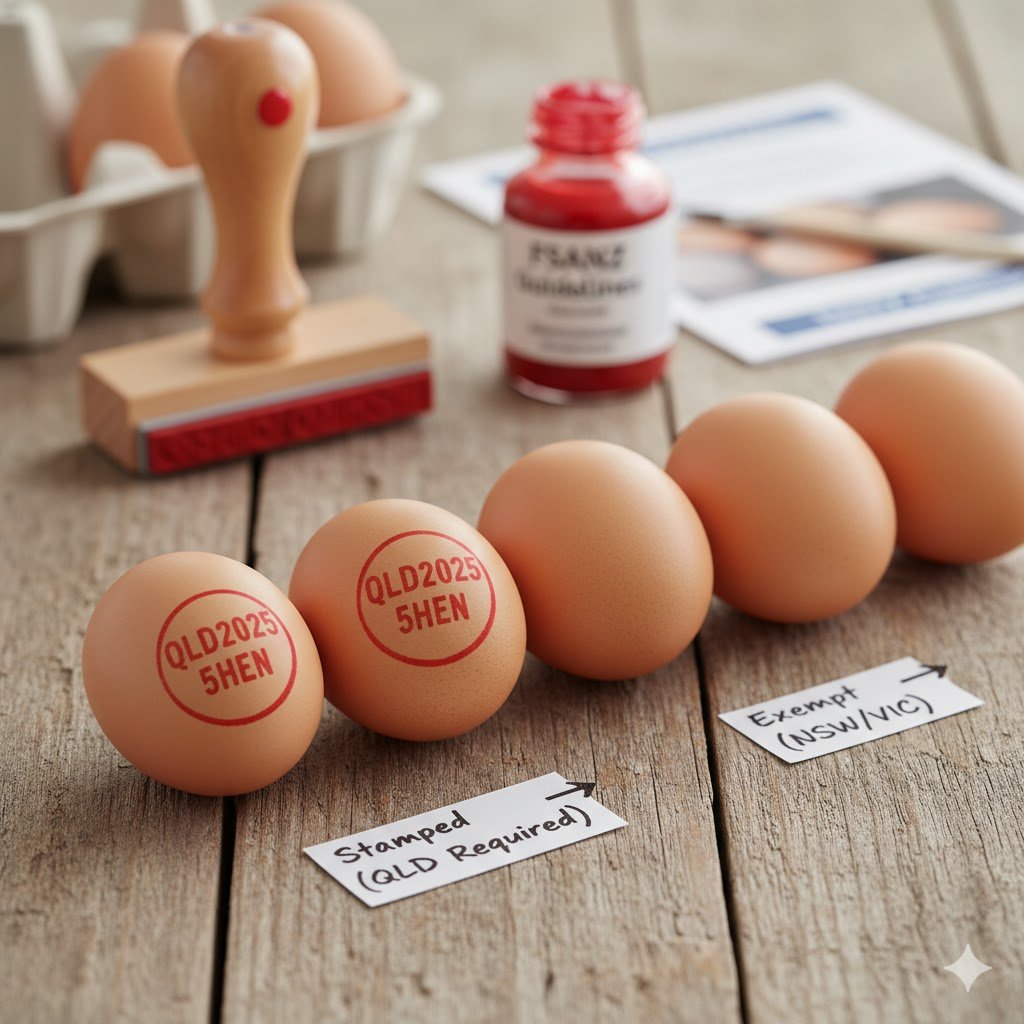
This is a really common question. You see the little red or blue codes on supermarket eggs, right?
For most hobbyists in NSW, Victoria, SA, WA, and TAS, the answer is NO.
If you are a small producer (e.g., under 50 hens in VIC or selling under 20 dozen/week in NSW) and you sell directly to the customer, you are usually exempt from stamping.
In Queensland, YES. Part of your accreditation with Safe Food Queensland involves getting a unique code that you must stamp on every egg.
Egg Stamp Australia Explained
That stamp is all about traceability. If there’s a food safety issue (like Salmonella), authorities can use that “egg stamp Australia” code to trace the eggs back to the exact farm, often within hours. It’s a key part of Australia’s food safety net.
How to Stamp Your Eggs (If You Need To or Want To)
Even if you’re exempt, some hobbyists choose to stamp. It makes your eggs look more professional and gives customers extra confidence.
- Get a Stamp: You can order a custom, self-inking rubber stamp online. You could have it made with your farm name or your registration code (if you’re in QLD).
- Use Food-Grade Ink: This is essential. You cannot use regular office ink. You must buy “food-grade” or “food-safe” ink. This is a non-toxic, vegetable-based ink that is safe to use on eggshells. You can buy this from specialty stamp or food-supply websites.
A simple stamp and a bottle of food-grade ink is a great investment and a natural fit for anyone wanting to get serious, attracting advertisers for products like labelling tools and rural supplies.
So, you’re registered and you know about stamping. But what if you’re still having trouble? Let’s look at some common problems.
Troubleshooting: “Why Can’t I Sell My Eggs?”
If you’re asking, “Why can’t I sell my eggs?” or finding that nobody is buying, it’s almost always one of these reasons. Here are the problems and their simple, actionable fixes.
Problem: You’re Not Registered (in QLD, NSW, etc.)
This is the biggest legal blocker. If you’re in QLD and not accredited, you legally can’t sell. In other states, you risk fines if you’re caught.
- Solution: Get compliant! Go to your state authority’s website (listed above) and do the 10-minute online registration. It’s the most important first step.
Problem: Your Eggs are Dirty
Nobody wants to buy eggs with poo, dirt, or feathers stuck to them. It’s a huge turn-off and a massive food safety red flag.
- Solution: The “Dry Clean” Method. Never, ever wash your eggs in water. Washing removes the “bloom,” a natural, invisible protective layer on the shell that stops bacteria from getting inside. Instead, “dry clean” them with a piece of sandpaper, a stiff brush, or a dry cloth to gently buff off any dirt just before you pack them. Clean nest boxes and proper ventilation start with good design—our guide to chicken coop designs for hot Australian climates covers shade, airflow, and materials that keep eggs cleaner.
Problem: Your Eggs are Cracked
You must not sell cracked eggs. Even a tiny hairline crack can let in bacteria like Salmonella, which can make people very sick.
- Solution: Inspect every single egg under a bright light. Keep any cracked ones for yourself and use them quickly (make sure to cook them thoroughly).
Problem: Your Chooks are Sick
If your flock has signs of disease (like lethargy, diarrhoea, or respiratory issues), you must not sell the eggs. This is a key biosecurity rule.
- Solution: Stop sales immediately. Separate any sick birds and contact a vet. You cannot resume selling until your flock is healthy.
Problem: Your Setup Looks Unprofessional
Are you selling in old, stained supermarket cartons? Is your honesty box just a rusty tin? People “buy with their eyes” first.
- Solution: Invest in your presentation. You can buy new, blank egg cartons in bulk from rural suppliers or online. A clean, neat label and a well-maintained “honesty box” make a world of difference.
Getting over these hurdles is easy. But breaking the rules, even by accident, can have serious consequences.
Understanding Your Limits: Scale and the Law
This section covers the legal limits of your hobby. We’ll look at how many eggs you can sell and what happens if you break the rules.
Can I Sell All of My Eggs? Understanding Quantity Limits
Yes, you can sell all your eggs, within the hobbyist limits.
If your 10 hens lay 70 eggs a week, you can sell all 70. The “limit” isn’t on how many of your eggs you can sell, but on the size of your operation (that ~20 dozen/week line) and who you sell to (direct-to-customer).
Once you get more than 50-60 hens and start producing over 20 dozen eggs a week, or if you want to sell to a cafe, you jump into the “commercial” category. That’s when you’ll need tougher licenses, regular audits, and a full food safety program.
What Happens If You Break the Rules? (The Big Fines)
It’s tempting to just put a sign out and hope for the best, but please don’t. State food authorities do follow up on complaints, and the penalties can be huge.
- Selling from an unregistered business: Fines can be in the thousands of dollars for operating an unregistered food business.
- Poor Labelling: Not having your name/address or a best-before date can also get you fined.
- Making Someone Sick: This is the worst-case scenario. If your eggs cause a food poisoning outbreak (like Salmonella), you could be personally liable for tens of thousands of dollars in fines, not to mention the guilt of harming someone.
For the 10 minutes it takes to register and the 30 seconds it takes to label a carton, it’s just not worth the risk.
Now for the fun part! Let’s get you set up to sell your eggs properly, step-by-step.
How Do I Sell My Own Eggs? Step-by-Step Guide for Hobbyists
Ready to start? “How do I sell my own eggs?” is the next logical step. Here’s a simple, actionable guide.
This is the answer to “Can I sell my eggs for money in Australia? Absolutely, if you’re compliant.”
Step 1: Check Your State’s Rules & Get Registered (Seriously!)
We’ve covered this, but it’s the most important step. This is the foundation for all “legal ways to sell home eggs Australia.” Go to your state authority’s website (NSW Food Authority, Agriculture Victoria, Safe Food QLD, etc.) and get registered. Do it now!
Step 2: Collect and Clean Your Eggs
- Collect Daily: Collect your eggs every day, or even twice a day in hot weather. This stops them from getting dirty or baking in the sun.
- Dry Clean Only: As we covered, do not wash your eggs. Use a stiff brush, a new bit of sandpaper, or a dry cloth to gently buff off any specks of dirt. A clean nest box makes this step much easier. If you’re still setting up your backyard, proper coop placement makes daily egg collection a breeze and keeps your flock healthier.
- Inspect: Check every egg for cracks. Only clean, uncracked eggs can be sold.
Step 3: Pack and Label Your Eggs
This is where you look professional and meet your legal needs.
- Pack: Use new, clean egg cartons. Do not reuse old supermarket cartons. They can carry bacteria and are a bad look. You can buy fresh, blank cartons in bulk from rural suppliers or online.
- Label: You must have a label. A simple sticker will do, but it must include:
- Your Name & Physical Address: This is for traceability. A PO Box is usually not enough.
- A “Best Before” Date: For fresh eggs, this is typically 35-42 days from the lay date. Pick a system (e.g., 5 weeks from packing) and stick to it.
- Storage Instructions: A simple “Keep Refrigerated” is perfect.
- Optional: You can also add words like “Farm Fresh,” “Backyard Eggs,” or “Free-Range.” Just make sure it’s true! A simple label maker is a great tool for this.
Step 4: Store Eggs Correctly (See next section)
You must store the eggs properly before you sell them. This is a key food safety step.
Step 5: Sell Your Eggs!
Here are the most common ways for hobbyists. These are some of the best “small flock egg selling tips” for getting started.
- Farm Gate / Honesty Box: A small sign at your gate with a box for the money. This is very popular in Aussie suburbs.
- Local Farmers Market: Check with your local market. You’ll need to show your state registration/permit and often your public liability insurance (this typically costs $200-$500/year for $10M cover).
- Friends and Neighbours: Good old word-of-mouth.
- Online: Local Facebook groups (like your suburb’s community page) or Gumtree can be great for advertising, but be sure to state “Pick-up only.”
How to Set Up a Secure “Honesty Box”
This is the easiest “set it and forget it” method.
- Location: Put it in a visible, well-lit spot, but ideally sheltered from rain and direct sun. In fire-prone areas, review our bushfire safety tips for backyard chickens to protect your setup during Australian summers.
- The Box: A simple cooler (esky) keeps the eggs at a stable temperature.
- The Money: Get a secure, lockable cash box and bolt it to your stand. A small “slot” on top is all you need. Check it daily.
- Signage: Have a large, clear, friendly sign with the price per dozen and a “thank you” message.
Your eggs are collected, cleaned, packed, and you’ve got a sales channel. Now, let’s nail that storage piece.
How Do You Store Eggs for Selling? Safe Tips for Backyard Owners
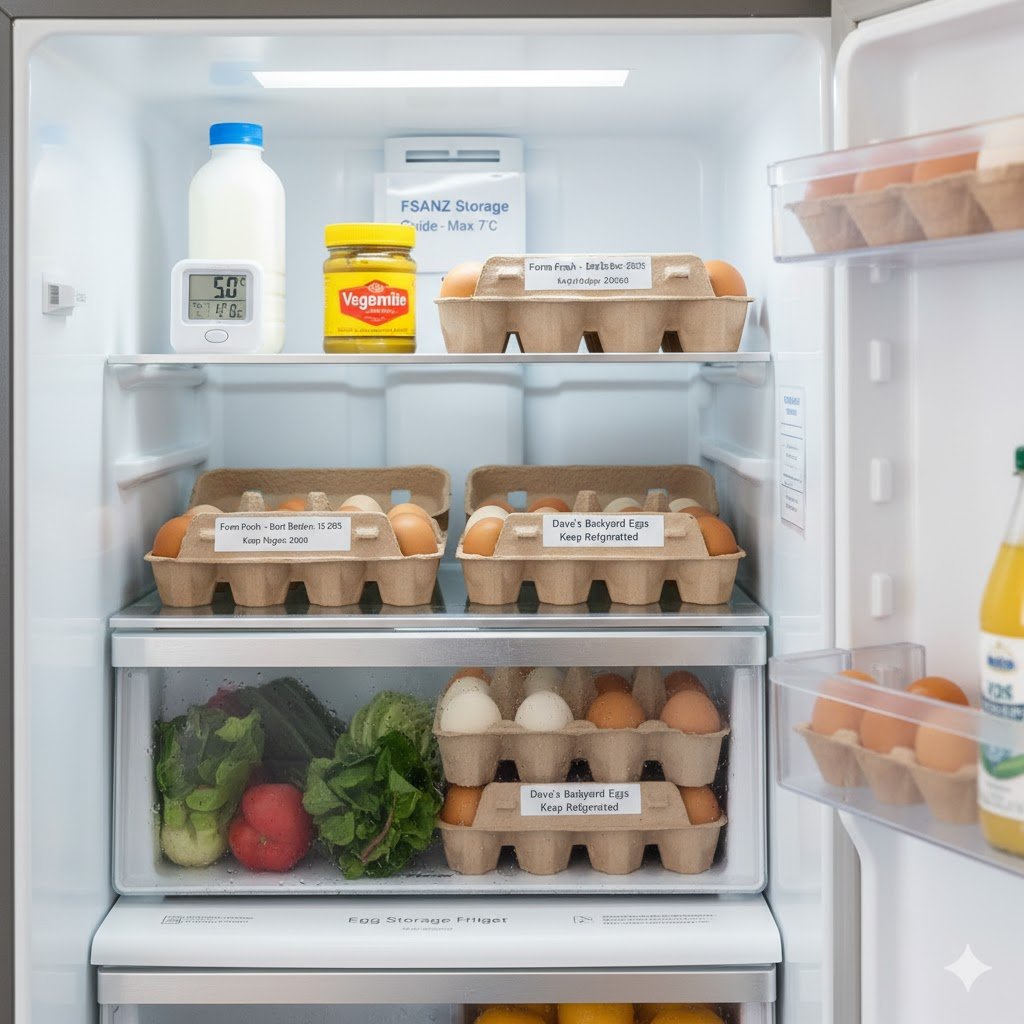
“How do you store eggs for selling?” This is a key food safety step. How you store your eggs directly impacts their quality and safety.
The Great Debate: Fridge vs. Counter (and the “Bloom”)
You’ll hear some people say fresh eggs last for weeks on the counter. This is partly true, thanks to that natural, invisible “bloom” (or cuticle) on the shell that we talked about. It seals the egg’s pores.
However, for selling to the public, you must be safer. The official FSANZ rule is that to prevent Salmonella growth, eggs should be stored at or below 7°C.
- Best Practice: Refrigerate your eggs as soon as possible after collecting and cleaning.
- Consistency is Key: Once an egg is refrigerated, it must stay refrigerated. A cold egg brought out to room temperature can “sweat,” which creates moisture that can help bacteria grow.
Pro Storage Tips:
- Temperature: Store eggs at or below 7°C. A regular fridge is perfect (usually 4-5°C).
- Storage: Keep them in the egg carton you’re selling them in. This protects them and stops them from absorbing smells from other foods (like onions!).
- Position: Store eggs pointy-end down. This keeps the yolk centred and the small air cell at the blunt end, which helps them stay fresh for longer.
When I started, I just used our kitchen fridge. Now that I sell a bit more, I have a small, dedicated bar fridge in the garage just for my eggs. Some serious hobbyists get a proper “egg storage fridge.” In hot Australian climates, proper storage is crucial—learn more about keeping chickens cool in summer to prevent heat stress that affects egg quality. This also looks great to any advertisers for home or rural supplies.
You’ve got the safety and process down. Let’s talk about the reward: the money!
How Much Money Do You Get for Selling Your Backyard Eggs in Australia?
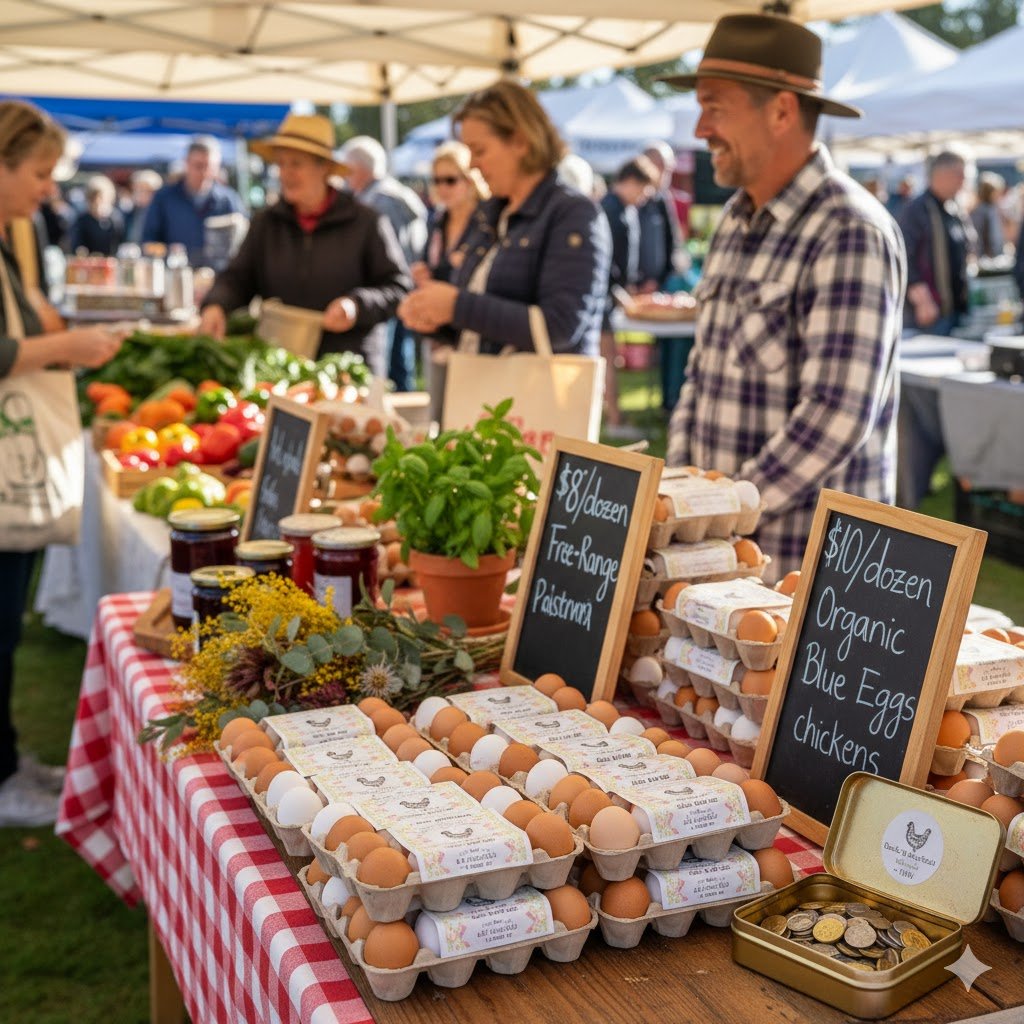
7
−
7−13 per dozen—customers happily pay more for truly fresh, local, free-range eggs than supermarket alternatives.
Okay, let’s talk money! “How much money do you get for selling one of your eggs?”
Most people sell by the dozen, not per egg. But let’s break it down.
- Per Dozen: In 2025, prices for fresh, free-range backyard eggs range from $7 to $13 per dozen.
- Per Egg: This means you’re getting about $0.50 to $1.00 per egg.
I sell my dozens for $8 at my farm gate, and they sell out every weekend. My neighbour, who has rarer breeds with blue shells, sells hers for $10. Choosing the right heat-tolerant chicken breeds for Australia ensures consistent egg production year-round, which matters when you’re selling.
Why so much more than the $5-9 in supermarkets? Because yours are fresh. Truly fresh. Your customers know they were laid just days (or hours) ago, not sitting in a warehouse for weeks.
How to Set Your Price
- Check the Market: Look on Facebook Marketplace and Gumtree for what others in your suburb are charging.
- Visit a Market: See a local producers at your nearest farmers’ market are charging.
- Consider Your Costs: Your price should at least cover your feed, cartons, and labels. Speaking of feed, our guide to best Australian poultry feed brands helps you choose quality nutrition at fair prices—typically $25-40 per 20kg bag.
- Don’t Undersell! People are happy to pay a premium for high-quality, local, fresh food. Yours are a specialty item, not a budget one. Grab bulk cartons from Bunnings to package pro-style and attract steady buyers.
Tax Time: Is It a Hobby or a Business?
This is the last big question. Do you have to pay tax? The Australian Tax Office (ATO) has a very clear “hobby or business?” distinction.
- It’s a Hobby if: You’re doing it for pleasure, not as your main income, and you’re not really intending to make a big profit (e.g., you’re just covering your feed costs). As a hobby, you do not pay income tax on your sales, but you also cannot claim expenses (like feed or coop repairs) on your tax return.
- It’s a Business if: You start to operate in a business-like way. This includes:
- You intend to make a profit (not just cover costs).
- You do it regularly and have a clear system.
- You’ve registered a business name or have a separate bank account.
For 99% of backyard sellers, it’s a hobby. You don’t need to worry about tax.
You only need to register for GST if your turnover hits $75,000 a year—far beyond hobby levels, per ATO 2025 rules. For hobbies, no income tax or deductions apply.
Selling eggs is a rewarding hobby, and now you know how to do it right from start to finish.
Conclusion: Your Aussie Egg-Selling Adventure
So, there you have it. “Selling backyard eggs in Australia” is not only possible, it’s a great way to be part of your local food community, make your chooks pay their own keep, and share the best-tasting eggs your neighbours have ever had.
The 2025 rules are all about one thing: safety.
As long as you:
- Follow your state’s simple registration rules (especially in QLD!).
- Practice good biosecurity (clean coops, healthy chooks).
- Only sell clean, uncracked eggs (using the dry-clean method).
- Pack and label them correctly (new cartons, your details, best-before date).
- Store them in a cool, safe place (like a fridge).
…you’ll be running a great little side business that you can be proud of.
Thanks for reading, mate. I hope this guide helps you get started. There’s nothing better than a customer telling you how good your fresh eggs were for their Sunday brekky.
Got a question or your own tip for selling eggs in your state? Drop it in the comments below!
Frequently Asked Questions (FAQs) for Selling Backyard Eggs
Q: Selling Eggs NSW?
A: Yes, it’s legal and straightforward—register free with the NSW Food Authority for small-scale direct sales under 20 dozen/week. No stamping needed.
Q: Can you sell eggs from home QLD?
A: Yes, but you MUST be accredited with Safe Food Queensland. This applies to everyone, even if you only sell one carton. This involves an application and an annual fee, and you will also need to stamp your eggs with your unique code.
Q: How much money do you get for selling one of your eggs?
A: You can get between $0.50 and $1.00 per egg. Most people sell by the dozen, with prices in 2025 ranging from $6 to $12 for a dozen fresh, free-range backyard eggs, depending on your location.
Q: Do I need an egg stamp in Australia?
A: Not always. In NSW, Victoria, SA, WA, and TAS, small hobbyists (e.g., under 50 hens) selling directly to the public are usually exempt. In Queensland, stamping is mandatory for all sellers.
Q: What is the main FSANZ rule for eggs?
A: The main rule for hobbyists from FSANZ (Food Standards Australia New Zealand) is to produce eggs that are clean and safe. This. This means keeping coops clean to prevent eggs from being contaminated (especially with Salmonella) and only selling clean, uncracked eggs.
Q: Can I sell unwashed eggs in Australia?
A: Yes! In fact, you should sell unwashed (or “dry-cleaned”) eggs. Washing eggs with water removes their natural protective layer (the “bloom”), which helps stop bacteria from getting inside. Use a dry brush or sandpaper to clean them instead.
Q: Do I need to pay tax on selling my backyard eggs?
A: For most people, no. The ATO (Australian Tax Office) sees small-scale selling (like covering your feed costs) as a “hobby.” Hobby income is not taxable, and you can’t claim expenses. It only becomes taxable if it grows into a profit-focused business.
Update: Checked November 2025—rules stable, but monitor state sites.

Oladepo Babatunde is the founder of ChickenStarter.com. He is a backyard chicken keeper and educator who specializes in helping beginners raise healthy flocks, particularly in warm climates. His expertise comes from years of hands-on experience building coops, treating common chicken ailments, and solving flock management issues. His own happy hens are a testament to his methods, laying 25-30 eggs weekly.
